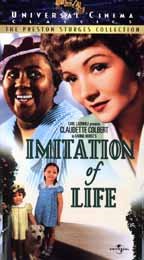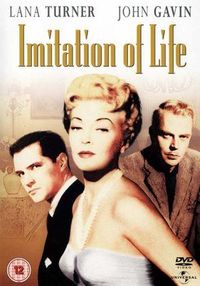Imitations of Life
Movie Reviews
Universals two-sided DVD release of both film adaptations of Fannie Hursts novel Imitation of Life, provides a great opportunity to compare and contrast times and styles for the 'picturization' of a work of literature. The novel itself is the story of two single mothers, one white, one black, their friendship, and the sacrifices they made for their daughters. From what I can gather from both films the novel was probably quite progressive for its time, though some elements would now doubtless seem retrograde.
The 1934 version of the film is my favorite of the two, it was truer to the novel and lacked some of the harshnes
 s of the 59 version. In this first film adaptation (directed by John M. Stahl), the never disappointing Claudette Colbert is Beatrice 'Bea' Pullman, recently widowed from a husband who had been picked by her father, she is just barely scraping by peddling the maple syrup her late spouse sold. Louise Beavers is Delilah Johnson, a stereotypical 'Mammy' figure who shows up at Bea's backdoor, having misread the address for a job interview. Though she can't really afford it, Bea takes Delilah and her very light skinned daughter Peola, in to live with her and her daughter Jessie.
s of the 59 version. In this first film adaptation (directed by John M. Stahl), the never disappointing Claudette Colbert is Beatrice 'Bea' Pullman, recently widowed from a husband who had been picked by her father, she is just barely scraping by peddling the maple syrup her late spouse sold. Louise Beavers is Delilah Johnson, a stereotypical 'Mammy' figure who shows up at Bea's backdoor, having misread the address for a job interview. Though she can't really afford it, Bea takes Delilah and her very light skinned daughter Peola, in to live with her and her daughter Jessie.Eventually Bea is able to take Delilah's pancake recipe and use it to launch a restaurant, and later with the help of a derelict/entrepreneur named Elmer Smith (Ned Sparks, who I now believe is who David Lynch was doing an impression of in his characterization of Gordon Cole for the Twin Peaks TV series), create a successful corporation that boxes the mix. While I'm very impressed with some of the issues that the film delt with in 1934, certain elements are so out dated as to make one uncomfortable. For example in true 'mammy style', even when the success of her pancake mix entitles Delilah to a small fortune, she prefers to stay on living with 'Ms. Bea'. Of course I could go on for some time talking about the ways in which this Imitation is a racial through back, and designed to minimize the potential discomfort of a white audience, but still considering its time it was a step forward, and still and effective story.
The 1959 version was director Douglas Sirks last Hollywood film. Sirk, who had
 risen from semi-obscurity to name recognition with a series of lavish technicolor romances, is working with a highly altered version of the story that fits in that category. Their are many repeated elements, and some repeated scenes, but the course of action is all together different from the original. This time Lana Turner is Lora Meredith, and Juanita Moore plays Annie Johnson as a good deal less of a charactcher then Beavers Delilah. Here the set up is similar, but Lora is an aspiring New York actress who eventually makes it big, and Annie is less responsible for her success.
risen from semi-obscurity to name recognition with a series of lavish technicolor romances, is working with a highly altered version of the story that fits in that category. Their are many repeated elements, and some repeated scenes, but the course of action is all together different from the original. This time Lana Turner is Lora Meredith, and Juanita Moore plays Annie Johnson as a good deal less of a charactcher then Beavers Delilah. Here the set up is similar, but Lora is an aspiring New York actress who eventually makes it big, and Annie is less responsible for her success.Of course both films largely focus on the daughters stories in their second halfs. Jessie/Susie falls in love with the one man who truly sets 'their' mothers heart on fire, in both cases his name is Steven Archer, but both films 'resolve' the situation differently. In the 34' version Steven is an Ichtiologist, played by the theatrical looking Warren William. In the 1959 adaptation Steven (John Gavin) is a fustrated photographer turned advertising executive.
The plot involving Mrs. Johnsons daughter has to do with her light skin, and a desire from earliest childhood to be 'white'. In both versions she is capable of "passing" to use the parlance of the times, and fustrated whenever her mother gives her away by showing up at an inopportune time. In Sirks version Sarah Jane, as she is called, is played for sex appeal by the 'developed' Susan Kohner, in 34' she is a morose Fredi Washington and slightly more likeable. The Johnson girl gets her big scene at the end in both pictures, its perhaps the most memorable moment of each but seems less believable and more out of nowhere in its second rendering.
Both Imitations of Life of are good, but if you have to pick just one see the original. For a good introduction to Douglas Sirks work see All That Heaven Allows.

1 Comments:
I've only seen the later version of Imitation of Life, but I really liked it. Many of the scenes stayed with me well after I watched the movie. I liked that I was able to sympathize with each of the characters even though their selfish tendencies became apparent at some point in the film- but it displayed a desperation for fulfillment that was eerily realistic.
Post a Comment
<< Home